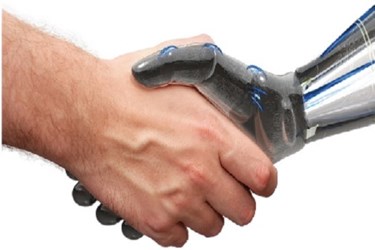Rise Of The Machines: What AI Means For The Sales Floor
By Michael R. Solomon

Everyone is buzzing about AI these days, as well as they should. Machines that “think” for us already are transforming how we work, play – and shop. McKinsey tells us that some 29 million U.S. homes used some form of smart technology last year, and that number is growing by over 30 percent a year.
Many organizations now deploy robots, avatars and chatbots to perform tasks we used to ask flesh-and-blood people to do. This suddenly makes the age-old question of what makes us human much less theoretical. Self-driving cars threaten to replace truck drivers. IBM’s Watson beats chess masters and veteran Jeopardy game show contestants. Movies and TV shows like Blade Runner, Westworld, and Humans that focus on the civil rights of synths, replicants and androids are center stage in popular culture. Alexa and Siri are our new guardian angels.
Sure, robots can work hard (and they don’t usually take sick leave), so already they are starting to replace human workers who do routine tasks such as warehouse fulfillment. But of course the AI revolution goes well beyond logistics and reaches deep into the front-of-the-store as well. In Japan, SoftBank started to sell the first full-scale humanoid home assistant to consumers. Pepper is intended to provide companionship and information to users. It (or he?) is equipped with “emotion engine” software that can read a person’s emotions via facial expressions and speech and react accordingly
But wait – isn’t the ability to “read” people the hallmark of a good salesperson? It’s just a matter of time before new-and-improved versions of Pepper start to populate the sales floor.
Are Stores Ready For That?
Retailers need to grapple with this question, and soon. As shoppers increasingly interact with machines instead of people, there are huge ramifications for the way we think about sales interactions, communications strategies, product design and marketing channels.
There’s a lot of talk (and perhaps some hype) about the AI Revolution, but the consequences are huge. AI’s (perhaps devastating) impact on the workforce coupled with a potential spike in efficiency present big challenges and opportunities. However, most of us aren’t yet thinking about AI’s impact on the essence of retail: The encounter between the customer and the store (online or offline).
So far, consumers seem eager to embrace these smart agents. One recent survey reported that about half of the women it sampled want to use them when they shop for beauty products. Of course, it’s still early days, and we need to learn a lot more about the factors that will attract or dissuade customers from seeking a machine’s advice. Clearly they will have to learn to trust the suggestions they receive, for example, and certainly there are consumer variables such as gender, social class/education, and experience with a product category that will make some of us more likely than others to embrace this new form of decision making.
There are many important questions that need to be addressed, such as these:
- How does the physical appearance of a robot or avatar sales advisor affect the likelihood that customers will trust and follow its’ recommendations about what to buy?
- How will chatbots and affective computing (where software detects a consumer’s emotional state) impact sales interactions?
- As advertisers use machine learning to generate artificial images for their messages, how will AI influence ideals of beauty and the fashion industry?
- What will be the impact of dating apps, sexbots and other smart devices on interpersonal relationships?
- How will facial recognition and wearable computer technologies meld with AI to create “markets of one” where the messages we see, and the products and services we buy, are highly customized to each individual consumer?
Very soon, the rise of the machines will become the race of the machines. Be sure you’re at the starting gate.
About The Author
Michael Solomon, Ph.D. is a keynote speaker, industry consultant, and Professor of Marketing in the Haub School of Business at Saint Joseph’s University in Philadelphia (www.michaelsolomon.com) He speaks to business groups about the future of consumer behavior and the shopping experience. His latest book is Marketers, Tear Down These Walls! Liberating the Postmodern Consumer.
